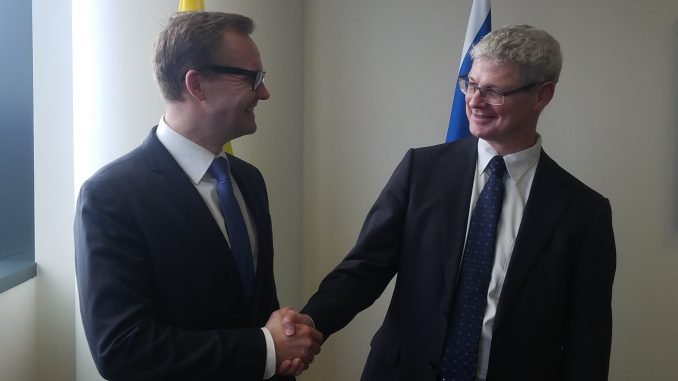
Both countries are determined to promote common goals and to further strengthen bilateral relations in areas of foreign and security policy, economy and trade, science and education, people-to-people contacts, culture, tourism and others.
Rolandas Kačinskas, political director at the Lithuanian Ministry of Foreign Affairs, shares his insights on the prospects of Lithuanian-Israeli cooperation.
On the history of Jewish-Lithuanian relations
We see today’s relationship between our two countries as a natural continuation of the joint Lithuanian Jewish history of more than 600 years.
For the most part, this common history was mutually rewarding and a positive one.
The strong relationship embedded in the history of the Lithuanians and the Jews is manifested by the support of the Republic of Lithuania, both over the years from 1918 to 1940 and after regaining independence in 1990, to the right of self-determination of the Jewish people, realized by the State of Israel.
Lithuania takes pride in the fact that the Litvaks contributed to the building of the foundations and prosperity of the State of Israel.
However, the 20th century and WWII in particular, also witnessed the darkest episodes in the history of the Lithuanian-Jewish relations. The historical tradition of our two nations living together in peace was painfully tarnished by those who sold their conscience by collaborating with the Nazis.
On Lithuanian-Israeli relations after the Independence
As we celebrate the 25th anniversary of the re-establishment of independence of Lithuania, it is worth noting that Lithuania’s regained freedom and independence as well as democratic transition has had a profound and multifaceted impact on Lithuanian-Jewish and the Lithuanian-Israeli relations.
On the issue of Lithuanian-Jewish relations, let me stress that the Lithuanian government recognizes the importance of the Holocaust remembrance, education and research. On a number of occasions the government stated a commitment to commemorating the Holocaust, combating anti-Semitism, and bringing the Lithuanian Jewish heritage back to public spaces and peoples’ minds.
Modern Lithuania’s position on the Holocaust is based on a conviction that it is not only the memory of the victims of the Holocaust that calls for historical truth and justice. The truth and justice must be restored also for the sake of citizens of modern and democratic Lithuania.
As for the Lithuanian-Israel relations, Lithuania’s independence has also allowed us to establish interstate relations with Israel that we never had.
Israel recognized Lithuania’s independence in 1991. Both countries established diplomatic relation in 1992.
Many visits of officials in both countries have followed over the years and today the political relations between Lithuania and Israel are at the highest level in our 24-year history.
Having said this, it does not mean we should not aim for even better, deeper and more diverse relations.
On what Lithuania could learn from Israel
On the Lithuanian side, we have a keen interest in learning from Israel how to push above the weight.
In this regard, areas of particular interest to Lithuania are these:
- Israel’s ability to deal with soft security challenges through developing cyber security knowledge and skills, increasing energy security, investing in renewable energy resources, such as wind, solar and hydropower.
- Israel’s ability to deal with traditional hard security threats – in combating terrorism, protecting external borders, building social resilience that can strengthen people’s ability to face threats.
- Israel’s potential for cooperation in economy, commerce, trade, especially in the areas of agriculture, high-tech, R&D, technology transfers. Lithuanian trade is increasingly looking for extra-European opportunities. Lithuanian economy, still being swept by a modernization drive, could therefore benefit from Israeli experience in startups and high tech know-how.
Lithuania has also much to offer to Israel. Lithuania’ growing international role (such as memberships in the EU and NATO, and a non-permanent seat in the UNSC), solid economic performance and its location in the safe and innovative Nordic-Baltic region has given us additional weight both politically and economically.

Be the first to comment